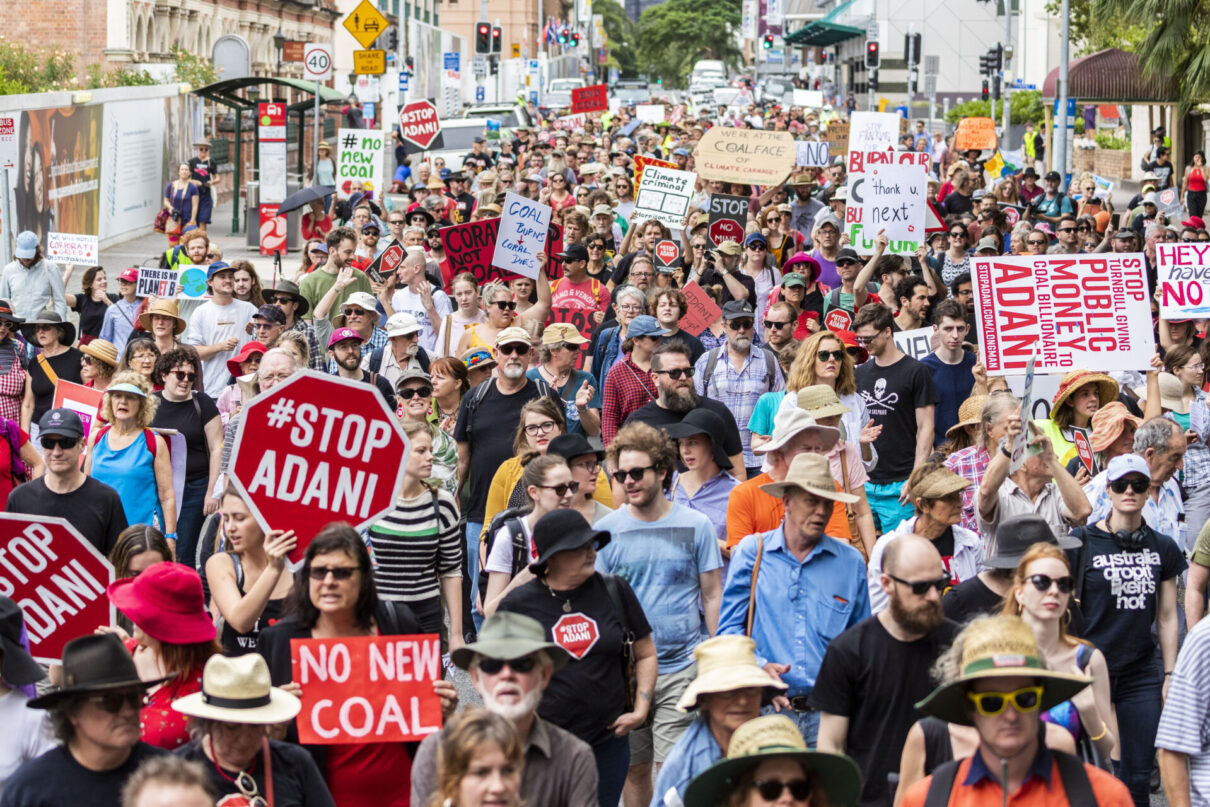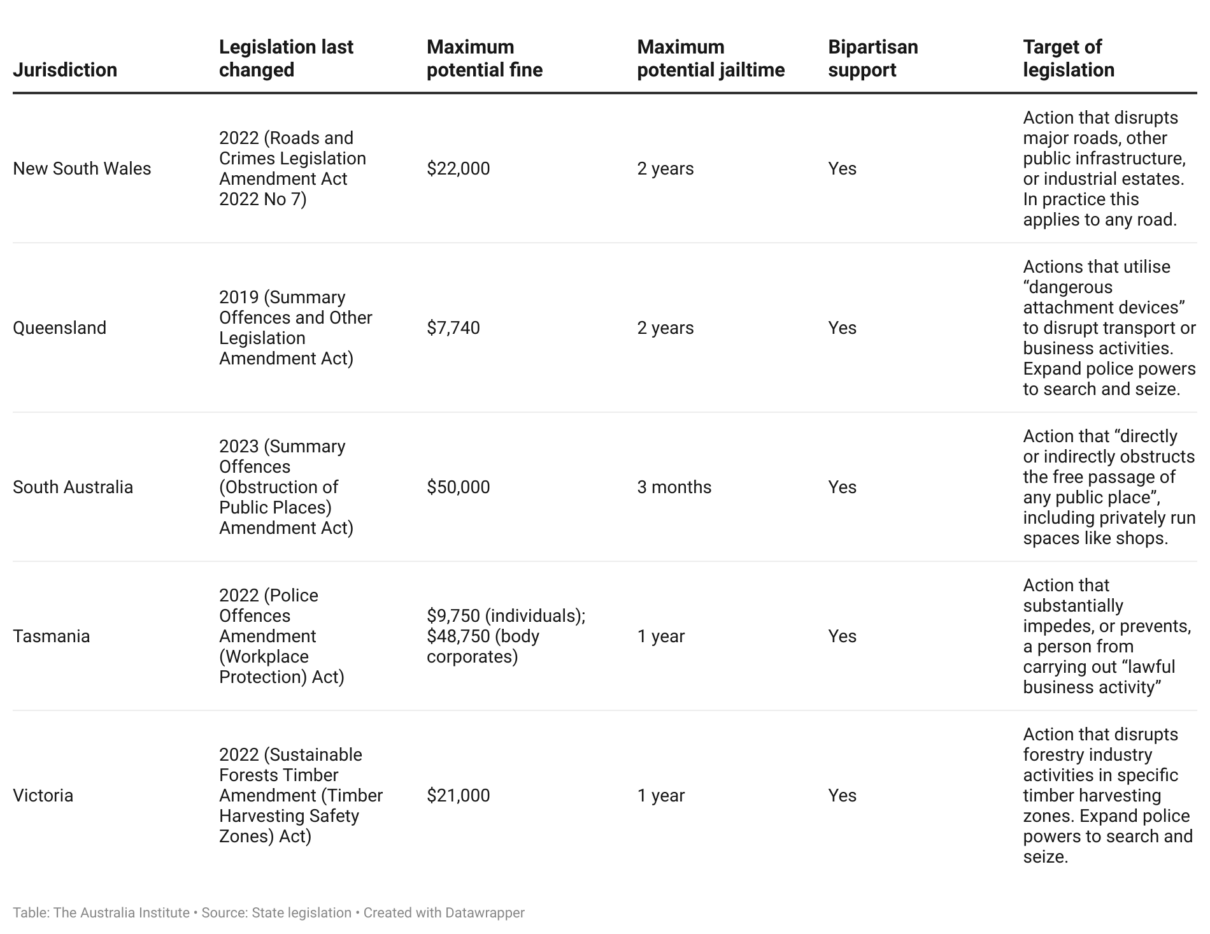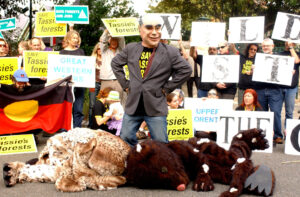Compared to the cost of protesting, buying time with a minister is very cheap

In Australia today, corporate lobbyists can cheaply access politicians in private while peaceful public protestors face draconian penalties.
While it is state laws that impose these draconian penalties, the Federal Government could secure the freedom to protest by legislating federal protections for peaceful protest, in line with Australia’s obligations under international agreements.
Whether it is women’s suffrage, the eight-hour workday or saving the Franklin River from being dammed, protest movements have been responsible for some of Australia’s most significant advances in human rights and environmental protection.
However, in recent years, governments across Australia have responded to peaceful protests, such as blockades to protect native forests or to stop fossil fuel infrastructure damaging natural environments, Indigenous heritage and farmland, by rushing through draconian anti-protest laws.
Five of Australia’s six states have passed anti-protest amendments in the past five years. South Australia now has the most punitive anti-protest laws in the country, while parts of NSW and Tasmania’s protest laws have been struck down by the High Court for being unconstitutional restrictions of political communication.
A protester in NSW who disrupts a ‘major road’ (in practice any road) faces a maximum fine of $22,000. Meanwhile, in Victoria, any action that disrupts forestry activities in specific timber harvesting zones can be fined up to $21,000. A protestor in South Australia can receive fines of up to $50,000 for any action that “directly or indirectly obstructs the free passage of any public place”, including privately run places like shops.
It appears that, so far, judges have generally awarded sentences below the maximum penalty. However, some protestors have received jail sentences, and recently 138 protestors from the Rising Tide protest were charged under NSW’s anti-protest laws, risking a $22,000 fine and two years in prison.
While protestors risk huge fines, lobbying on behalf of private, corporate interests remains under-regulated, including the ongoing practice of ‘cash-for-access’ payments – where money changes hands for privileged access to politicians.
Access to politicians is cheap: in 2024, it typically costs from $1,500 to $4,000 for a meal with a government minister. Special occasions offer even more opportunities, for instance during the 2024 federal budget there was a “Standing Networking Dinner” with the Prime Minister, Minister for Finance and a government backbencher with tickets costing just $1,500 per person.
While South Australian protestors can receive fines of up to $50,000, it costs lobbyists only $4,000 for meetings with South Australian politicians including the Minister for Foreign Affairs Penny Wong; Minister for Trade and Tourism and Special Minister of State Don Farrell; and Minister for Health and Aged Care Mark Butler. In other words, the maximum fine for a single protester in South Australia could pay for twelve lobbyist meetings with prominent South Australian ministers.
Many cash-for-access payments are not publicly disclosed. Payments over $17,000 are disclosed (after a wait of up to 18 months). But, when dinner with the Prime Minister only costs $10,000 or less, the result is that most of these payments happen in secret.
Despite efforts by politicians and the media to undermine the social legitimacy of protest by labelling them “annoying” or “self-indulgent”, Australia Institute polling research shows widespread support for peaceful protest.
Seven in ten Australians (71%), and a majority across all voting intentions, support federal legislation to protect the right to peaceful protest. Four in five (79%) agree that peaceful protest has a role to play in Australian democracy. Eight in ten (81%) believe cash-for-access should be subject to the same or stricter restrictions as donations to political parties.
By making secret lobbying cheap and easy, while making public protests illegal, governments have clearly revealed whose voices they think should be heard – and whose should be silenced.
And that’s something else worth protesting about.
Between the Lines Newsletter
The biggest stories and the best analysis from the team at the Australia Institute, delivered to your inbox every fortnight.
You might also like
Who’s going to stand up and make Nazis ashamed again?
A “March for Australia” rally sounds benign, but people who plan to attend the “March for Australia” rallies around the country on Sunday will almost certainly be marching alongside white supremacists and neo-Nazis.
Trump has long speculated about using force against his own people. Now he has the pretext to do so
“You just [expletive] shot the reporter!” Australian journalist Lauren Tomasi was in the middle of a live cross, covering the protests against the Trump administration’s mass deportation policy in Los Angeles, California. As Tomasi spoke to the camera, microphone in hand, an LAPD officer in the background appeared to target her directly, hitting her in





